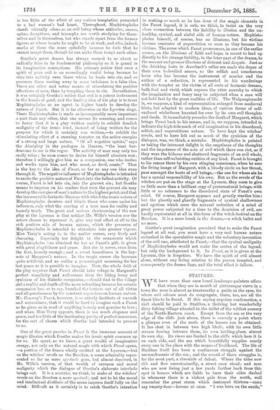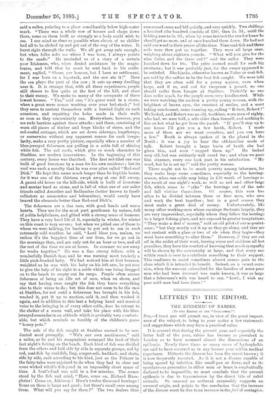STAITHE S.
WE have more than once heard landscape-painters affirm that when they are in search of picturesque views in a town the nose is almost as trustworthy a guide as the eyes, for where evil odours most do congregate, there, too, are all the finest bits to be found. If this saying requires confirmation, a visit should be paid to Staithes, a thriving but wonderfully dirty fishing village situated in the midst of the wildest scenery of the North-Eastern coast. Except from the sea or the very edge of the cliffs just above, there is scarcely a point where a glimpse even of the roofs of the houses can be obtained. It lies shut in between two high bluffs, with its own little stream flowing between them, its own landing-place, almost its own sky. Its views are limited to the cliffs which hem it in on each side, and the sea which bountifully supplies nearly every one in the place with the means of livelihood. The life of Staithes itself has been a continuous struggle against the encroachments of the sea ; and the record of these struggles is, for the most part, a chronicle of defeat. Where the tides now ebb and flow unrestrainedly, a street once stood; and men who are now living just a few yards further back from this spot in houses which are liable to have their sides dashed in whenever there is a violent gale from the north, well remember tho great storm which destroyed thirteen—some say twenty-four—houses at once. "I was born on the sands," said a sailor, pointing to a place considerably below high-water mark. "There was a whole row of houses and shops down there, some on theta built as strongly as a body could wish to see. I can mind as clear as possible when eleven of us childer had all to be clicked up and got out of the way of the water. It burst right through the walls. We all got away safe enough ; but when folks asks me where I was born, I always points to the sands." He reminded us of a story of a certain poor Irishman, who, when denied assistance by the magis- trates, and told that he must be sent back to his settle- ment, replied, "Shure, yer honour, but I have no settlement, for I was born on a haystack, and the cow ate it !" Here the sea plays the part of the cow ; it eats up every dwelling near it. It is strange that, with all these experiences, people still choose to live quite at the foot of the hill, and close to their enemy. We spoke to many of the occupants of these lowest houses. "Yes," said one, "it's queer work in a storm, when a great wave comes washing over your bed-stock ;" but they seem to content themselves with a hurried flight on such occasions, and repairing the holes made in their walls as soon as they conveniently can. Everywhere, however, you see rude barriers against these attacks ; and these, consisting of worn old pieces of timber and huge blocks of stone, and the red-roofed cottages, which are set down sideways, lengthways, or cornerwise without any apparent reason for such irregu- larity, make a very pretty picture, especially when a number of blne-jerseyed fishermen are pulling in a coble full of shining white fish. The red roofs, which give so much character to Staithes, are modern innovations. In the beginning of this century, every house was thatched. The first red-tiled one was built of good freestone by a man for his own residence ; but its roof was such a novelty that lie was ever after called "Red-roof Dick." He kept this name much longer than he kepthis house, for it was one of the thirteen swept away at one fell swoop. A gaunt old house on the hill-side, which is built of ironstone and mortar hard as atone, and is full of what one of our sailor friends called Amoritee and Bedlamites (better known to fossil- collectors as ammonites and belemnitee), would surely have braved the elements better than Red-roof Dick's.
The fishermen are a fine race, with good heads and warm hearts. They are for the most part gentlemen by nature, full of polite helpfulness, and gifted with a strong sense of humour. They have a very hard life of it, especially in winter, for winter on this coast is very severe ; but when we pitied one of those to whom we were talking, for having to put out to sea in such extremely cold weather, he said, "Lord bless you, ma'am, we reckon it's the happiest time of our lives, for we go out in the mornings then, and are only out for an hour or two, and all the rest of the time we are at home. In summer we are away for weeks together." He was a fine strong fellow, with a wonderfully Danish face, and he was nursing most tenderly a little pink-frocked baby. We had noticed him at first because, weighted as he was with his baby on his left arm, he yet rose to give the help of his right to a coble which was being dragged on to the beach to empty out its cargo. People often accuse fishermen of being an idle set of men, when on shore, and say that having once caught the fish they leave everything else to their wives to do ; bat this does not seem to be the case at Staithes, for not until a fisherman has brought in his fish, washed it, put it up to auction, sold it, and then washed it again, and in addition to this lent a helping hand and musical voice to the bringing in of every other coble, does he retreat to the shelter of a warm wall, and take his place with his blue- jerseyed comrades in an attitude which is probably very comfort- able, but which reminds us forcibly of the children's game "honey pots."
The sale of the fish caught at Staithes seemed to be con- ducted most promptly. " We's our own auctioneers," said a sailor, as he and his companions arranged the fruit of their last night's fishing on the beach. Each kind of fish was divided from the others and laid side by side in separate groups, cod by cod, coal-fish by coal-fish, ling, conger-eels, haddock, and skate, side by aide, each according to his kind, just as the Princes in the fairy-tales were enjoined to do when they had to clear oat some wicked witch's fish-pond in an impossibly short space of time. A boat's-load was sold in a few minutes. The owner stood by the fish and cried, "Here, come on, Richard Hum- phries! Come on, Atkisson ! Here's twelve thousand herrings ! Some on them is large and good ; but there's small ones amang them. What will you say for them ?" The two dealers thus
summoned came and bid quietly, and very quickly. Two shillings a hundred (the hundred consists of HO), then 2s. 3d., until the bidding rose to 3s. 9d., when by some instinct the vendor knew he should get-no mom, and at once knocked them down. He had not said one word in their praise all the time. Nine coal-fish and three cods were then put up together. They were all large ones, weighing about eighteen pounds. "What will you give for the nine Zulus and the three cod ?" said the sailor. They were knocked down for 16s. The price seemed small for such big creatures ; but it was probably just, for the owner appeared to be satisfied. Blackjacks, otherwise known as Zulus or coal-fish, are said by the sailors to be the best fish caught. We were told that they are often sold for a penny a-piece, even when large, and if so, and cod for twopence a pound, no one should suffer from hunger at Staithea. Probably no one does suffer much, for the people seem very kindhearted. While we were watching the auction a pretty young woman, with the brightest of brown eyes, the sweetest of smiles, and a most taking sun-bonnet, came running up, calling "Robert, Robert !" We looked, and Robert was an old, toothless, worn man of eighty, who had, we were told, a wife older than himself, and nothing to live on but what he got from the parish. "If you'll step up to our house I'll give you a few broth, Robert. I made more of them nor we want ourselves, and you can have a few." Broth is always spoken of in the plural in the North ; it was a joy to hear the old-familiar mode of talk. Robert brought a large basin of broth she had
given him, and soon "supped them up." He looked very old, but was evidently well cared for ; and when we gave him sixpence, every one took part in his satisfaction. "My word, but he is set up !" said the pretty woman.
There ought not to be much poverty among fishermen, for they make large slims sometimes, especially in the herring- season, when one coble may bring in £30 worth of herrings as the result of one night's work, as well as cod and other large fish, which come to " pike " the herrings out of the nets and fall victims themselves. Of course, this sum has often to be divided between three or four men, who own and work the boat together ; but in a good season they must make a great deal of money. Unfortunately, like many other working-men whose earnings fluctuate largely, they are very improvident, especially where they follow the herrings to a larger fishing-place, and are exposed to greater temptations. "They make a deal o' money," said an old pilot of our acquaint- ance; "but they mostly eat it up as they go along, and they are not content with a glass or two of ale when they begin—they must have something to alter them." However, if they are cut off in the midst of their work, leaving wives and children all but penniless, they have the eomfort of knowing that much sympathy will be shown by the community at large, and that every one within reach io sure to contribute something to their support. This readiness to assist sometimes almost causes pain to the class which it is intended to benefit. Indeed, on a recent occa- sion, when the amount subscribed for the families of some poor men who had been drowned was made known, it was so large that a fisherman's wife was heard to say, " Lord ; I wish my poor auld man had been there ! "



































 Previous page
Previous page